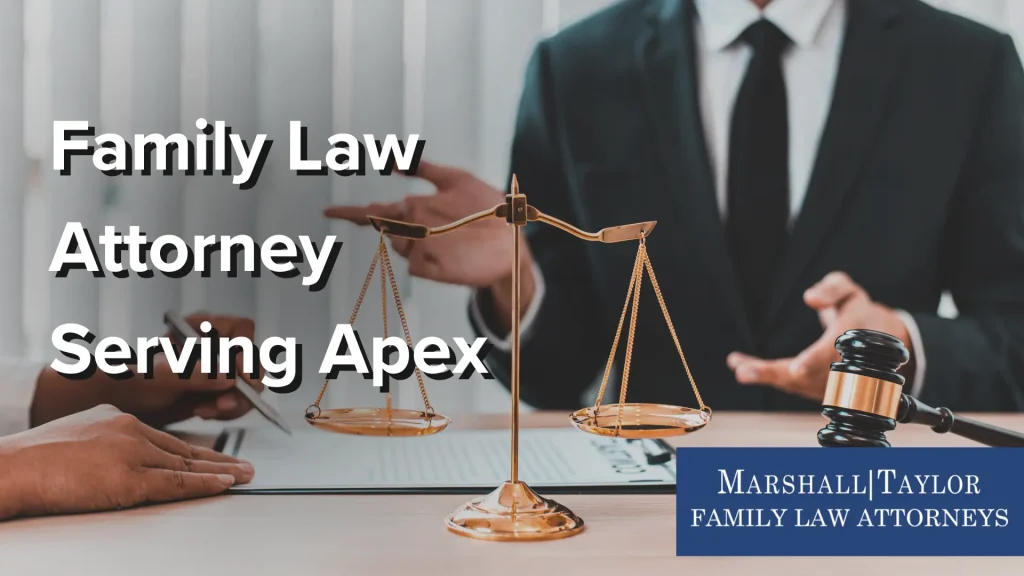
Whether you’re filing for divorce, pursuing alimony from your ex, or seeking representation for another type of family law case, you should reach out to Marshall & Taylor PLLC today. We can review the circumstances and determine whether we can find the solution to the obstacle you encountered.
The decision to file for divorce or finding out that your spouse has filed can stir up a range of emotions. When you dissolve a marriage, you must agree on child custody, property division, and other terms. Disputes can arise, and negotiations could require a mediator or litigation.
At Marshall & Taylor PLLC, we know how to help our clients navigate the complexities of divorce proceedings. Our team will protect your rights and fight to try to reach your desired outcome. You can count on us to tailor our approach to the unique circumstances of your case to meet your every need.
For a consultation with a trusted and experienced divorce and family law lawyer in Apex, NC, call Marshall & Taylor PLLC at (919) 833-1040 right now.
Cases Marshall & Taylor PLLC Takes
Marshall & Taylor PLLC can represent you in any type of divorce case or family law matter, such as:
- Collaborate divorce
- Child support
- Separation
- Alimony
- Child custody and visitation
- Mediated divorce
- Domestic violence and restraining orders
- Alternative dispute resolution
- Property division
- Adoption
- Contested divorce
- Uncontested divorce
Do not hesitate to call Marshall & Taylor PLLC if you face a dispute that you need help resolving.
Contested Divorce vs. Uncontested Divorce
In North Carolina, a divorce can be either uncontested or contested.
A contested divorce occurs when a couple has disputes regarding the terms of their divorce. They can’t agree on things like dividing property, creating a child custody agreement, or which person can stay in the marital home.
Resolving the matter through litigation becomes necessary. That means a judge can decide how to settle the case, leaving each party with no control over the outcome.
An uncontested divorce is often simpler than a contested divorce. The couple might not agree on all aspects of the divorce but can negotiate the terms without legal action. The matter remains amicable, and each person gets more of what they want out of the arrangement.
Elements of a Divorce in North Carolina
A couple can only file for divorce if they meet the requirements under North Carolina statute § 50-6:
- At least one person involved in the divorce proceedings lived in the state for at least six months
- The couple resided separately for at least one year
Since North Carolina is a no-fault divorce state, you could dissolve your marriage even if your spouse didn’t do anything wrong. You don’t need a reason, such as adultery, to file. You could decide that you are no longer compatible and need to go your separate ways.
Alimony
North Carolina statute § 50-16.3A states either person in the divorce proceedings can pursue alimony. The court will award alimony if:
- One person is the dependent spouse;
- The other party is the supporting spouse; and
- Alimony is equitable based on all relevant factors.
The judge can use their discretion while reviewing the case and deciding the amount and duration of the alimony awarded to the dependent spouse. Alimony could last indefinitely or for a predetermined timeframe.
Multiple factors could determine how the judge rules, including:
- Each spouse’s age and mental, emotional, and physical condition
- The relative earnings and earning capacities of both parties
- The length of the marriage
- The standard of living the couple established while married
- Either person’s marital misconduct
- The sources and amounts of both spouses earned and unearned income, including earnings, dividends, and benefits, such as retirement or medical
- The property either party brought into the marriage
- Both spouse’s relative needs
- How much serving as the custodial parent to a minor child will affect the person’s expenses, earning power, or financial obligations
- One party’s contributions to the other’s training, education, or increased earning power
- One spouse’s contributions as a homemaker
- Tax consequences, on the local, federal, and state level, of an award for alimony
- The relative assets, liabilities, and debt service requirements of each spouse
- The relative education of the spouse seeking alimony and the time needed to obtain sufficient training or education to find a job satisfying their economic needs
Division of Property
 The court reviews a divorcing couple’s property to determine what is considered divisible property and marital property. The court splits the property based on equitable distribution.
The court reviews a divorcing couple’s property to determine what is considered divisible property and marital property. The court splits the property based on equitable distribution.
Equitable distribution does not always mean dividing everything down the middle. Sometimes, it’s more equitable to give one spouse more assets than the other if they are dependent or have no way of supporting themselves financially.
There are three categories of property in a North Carolina divorce:
- Marital property – Marital property includes any personal and real property either party acquired during the marriage but before the date of separation.
- Separate property – Any real or personal property one person acquired before marriage or after getting married is separate property. This also includes property acquired before the separation date. For example, receiving an inheritance from a family member could be separate property.
- Divisible property – Divisible property is all personal and real property, including passive income from marital property received after separating, all diminution and appreciation of divisible and marital property value after the separation date but before the distribution date, passive decreases and increases in marital debt and financing charges and interest associated with the debt, and all property, property rights, or any portion acquired by either spouse due to their efforts during the marriage and received before the distribution date but after separating.
Child Custody and Support
A judge can settle an action or proceeding involving child custody and child support by reviewing guidelines under North Carolina statutes § 50-13.1 to 50-13.9. The courts base their rulings on which parent will best promote the child’s interests and welfare.
The custodial parent is the parent who resides with the minor children, while the non-custodial parent does not. The court might order the non-custodial parent to pay child support to provide for the kids’ basic needs, such as housing, food, and healthcare. Typically, child support continues until the child turns 18 years old unless special circumstances apply.
Contact Us
At Marshall & Taylor PLLC, we know the toll a divorce can take on the parties involved, and we strive to provide the support and services necessary to get you through this challenging time in your life. We will remain by your side until the end.
If you’re going through a divorce or dealing with another family law matter, contact us at (919) 833-1040 today for your confidential consultation with one of our family law lawyers in Apex, NC.
